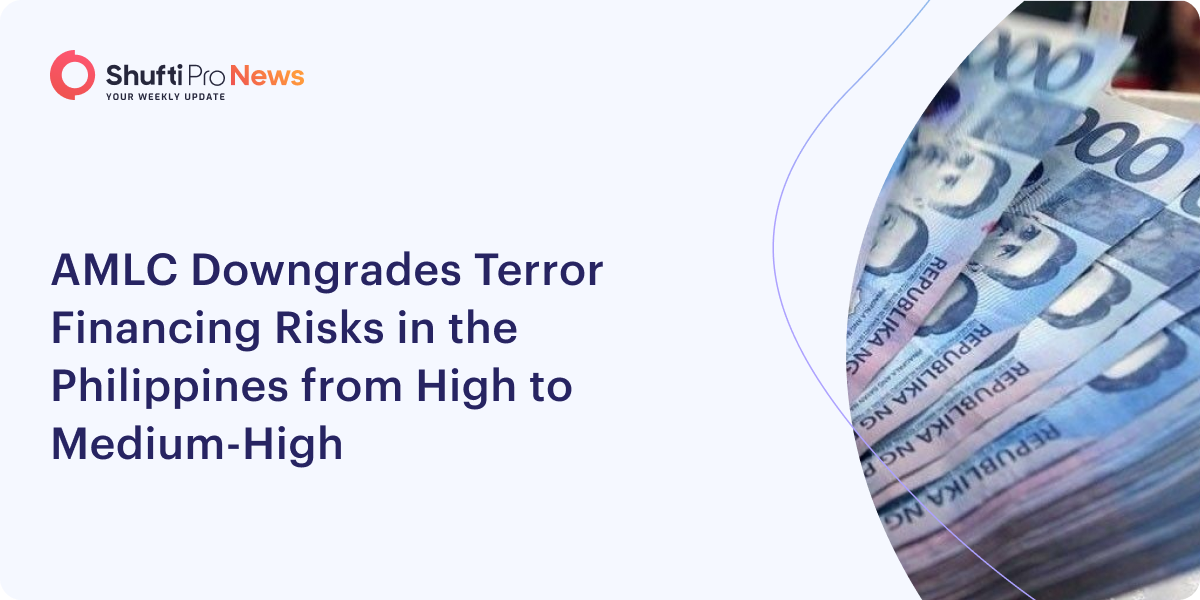AMLC Downgrades Terror Financing Risks in the Philippines From High to Medium-High

According to the anti-money laundering council, the Philippines’ terrorist and terrorism financing vulnerability has been downgraded from a high threat to a medium-high threat.
As a result of efforts and strategies both public and private sectors are pursuing, the threat and vulnerability associated with terrorism and terrorism financing has been downgraded from high to medium-high. Based on the AMLC’s Terrorism and Terrorism Financing Risk Assessment for 2022, it is stated that “The rating entails that the public and private sector continue their efforts and strategies that have been undertaken and implemented in the combat against terrorism and its financing.” As mitigation measures are still under development, the financial intelligence unit estimates that the proliferation financing risk is medium-high based on its initial assessment.
“Thematic assessments likewise show an improved level of compliance by financial institutions through the adoption of screening systems and increased capacity building. Inherent risks of terrorism and terrorism financing – globally and domestically – remain high,” the AMLC said. There is a continuing evolution of terrorism as terrorists and attackers develop new strategies for recruiting and executing terror operations, according to the AMLC, “The Philippines must continue to be aggressive in its efforts to combat terrorism and its financing. Terrorist groups, international and domestic, are still present, though their activities are becoming dormant and waning. This further implies that these terror groups are losing resources and funding.”
The financial intelligence unit stated that despite vulnerabilities, the government and private sectors are trying to mitigate them. It also added that dismantling terrorist financing networks is another method of eliminating terrorism in addition to law enforcement.
The AMLC stated, “Preventing terrorists and threat groups access to funds and resources degrade their capability to launch operations and attacks; infuse higher risks; and cause uncertainty into future operations. The same approach can be applied to combating proliferation financing.”
In addition, sanctions freeze orders and extensive public awareness campaigns have all contributed to the mitigation of elements of proliferators and supply actors, as have extensive public awareness campaigns regarding the proliferation of weapons of mass destruction and international cooperation and engagement. The AMLC stated, “It has been proven that domestic and international coordination mechanisms are instrumental in providing better responses to the threats posed by terrorism, terrorism financing, the proliferation of weapons of mass destruction, and its financing; thus, should be retained and further strengthened. Recent experiences have shown that close domestic and international coordination among the AMLC and relevant government agencies yielded positive results.”
With a score of 6.790, the Philippines ranked 16th in the 2022 Global Terrorism Index (GTI) Report, a score that decreased from 2017 but remained in the high category. From 2011 to 2021, it has consistently been one of the Asia-Pacific countries with the highest GTI scores. Data on the attacks, deaths, injuries, and hostages significantly improved the GTI rating. In 2021, there were 53 deaths in the Philippines compared with 97 in 2020, showing a decrease in victims for the second consecutive year. Over the last decade, the Philippines experienced the highest terrorism death rate, with over 1,000 deaths out of 3,250 in the Asia-Pacific region.
AMLC conducted an “An Assessment of the Philippines’ Exposure to External and Internal Threats” study of 1,186 suspicious transaction reports spanning 2018-2020 involving terrorism financing, totalling P324.9 million, identified as suspicious transactions involving current accounts/savings accounts. From 2013 to 2017, 396 suspicious transactions were reported, a substantial increase from the previous assessment. A study by the University of the Philippines found that funds allegedly derived from terrorism and terrorism financing mostly remained in the Philippine financial system.
Suggested Reads:
NIGERIAN-OWNED TECH FIRM, FLUTTERWAVE, CLOSES 45 BANK ACCOUNTS DUE TO MONEY LAUNDERING
EFCC WARNS FINANCIAL CRIME IS THRIVING IN REAL ESTATE
HM REVENUE & CUSTOMS (HMRC) FINES PROPERTY FIRMS OVER £1 MILLION FOR MONEY LAUNDERING VIOLATIONS

 Explore Now
Explore Now













